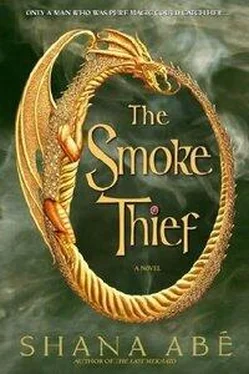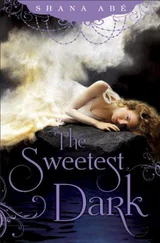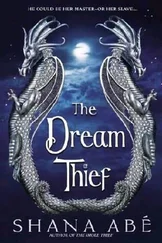He had been too stubborn to die. He had flopped back on her new Hepplewhite settee, smearing a great deal of blood across its dainty lemon stripes—and lived.
The settee had been regretfully dispatched, but Zane, her dogged waif, had dug in. He was weak and malnourished and a misfit. He had no manners, no grace, and a great deal of rude wit. He screeched like a banshee whenever she ordered him to bathe.
And yet . . . Rue remembered how it felt to be small, to be alone.
She had granted him a bed in the attic, assigned him chores—which he hardly ever performed—and so sealed their unlikely, uneasy alliance.
He knew what she was. He never said it, never asked. But he knew.
Boy and woman studied each other now in the thin yellow light. Even with the sweet smile he looked like nothing so much as an underfed elf. She wondered how he managed it; she knew for a fact he routinely ate enough to fatten three grown men.
Zane gestured to the table.
“Did you see what I brun—brought?”
She shook her head, turning back to the papers. “I've read these.”
“Not that one. Nipped it from The Spotted Dog. Last week's news, but I thought you'd like the bottom-right bit.”
“At least your reading is coming along.”
“An' I washed my face last Sunday,” he said virtuously.
She picked up the paper, turned it over and found his story.
Rare Langford Diamond to Be Displayed at the Stewart
For an instant her heart stopped.
Langford. Diamond. Here.
There had to be a mistake. The tribe would never—
“What d'ye think, my lady?” asked Zane, at her elbow. “A diamond an' all. Is it good?”
She looked up and caught her own reflection in the mirror across the room, marble pale, dark-eyed. Her wig was a silver cascade to her shoulders; candlelight threw a halo against her face.
“Have the maid wash your livery when she returns,” Rue said, and took the paper with her as she left the room.
In the hills and vales of Darkfrith there lived a saying: Kiss the sky, kiss the ground, and all the world shall come unbound.
All the children of the tribe knew it, learned it in verse and in song; they grew up with its lesson, courted, wed, and then passed it down again to their own children.
But someone, it seemed, had taken the verse a bit too well to heart.
A runner.
“Smoke Thief,” said Rufus, slapping the newspaper down in front of Christoff with a flourish. “He's back again, our lad.”
The dining hall of Chasen Manor was nearly empty, the main meal long since finished. The fire was low in the hearth but still snapping. Servants moved through the chamber in hushed efficiency, clearing plates and flatware with the barest of tinkling clatter. They had yet to approach the ring of dishes around the head of the table; between the cold fried parsnips and the remains of a stuffed pheasant were a scattering of papers, periodicals, and Kit's own scribbled notes, written in impatient black strokes.
He leaned back in his chair, pushing a hand through his loose hair, remembering too late the ink on his fingers. He had no tolerance for wigs or powder or queues. Out here, in the country, no one minded anyway—at least, not to his face. But he'd meant to get a haircut. He always seemed to forget.
“What was it this time?”
“A tiara. Necklace. Right from under the nose of Monfield.”
Kit inspected the nib of his quill. “Really. Did the duke get a look at him?”
“Well, he must've, hadn't he? Says he fought the fellow. Dueled with him.”
From across the room by the fire came a sigh; Kit barely suppressed his own.
“I find myself constantly surprised at the mendacity of the press.” He turned the paper around with one finger so he could read it. “Dueled with him. Indeed. He'd not be around to boast about it if he had.”
“Dunno why you'd be surprised still,” commented George, ensconced in his favorite chair over by the hearth. “You've dealt with enough of their nonsense yourself since inheriting the title.”
“True. Perhaps I've been hoping for their reform.”
“Not likely.” Rufus took his own seat. He lifted his boots to the table's edge, caught the look Kit slanted him, and dropped them to the floor again. “You're one of their favorite sports. Marquess of Langford Attends a Ball. Marquess of Langford Escorts Lady So-and-So. Marquess of Langford Scratches His Arse .”
“I hadn't seen that last one,” said Kit mildly.
“They do enjoy you,” remarked George, his palms spread over his belly.
“All they enjoy is fresh blood.”
“And you're it, my lord.”
“I was .” Kit tapped the headline. “But it appears I've been upstaged.”
Smoke Thief. For the past three years Christoff and the council had been following his exploits, ever since the Evening Standard had dubbed the fellow with that most telling appellation. Logic dictated he'd been operating much longer than that, but despite Kit's social connections and a good deal of silver greasing palms, no one anywhere seemed to know much about him. He was fodder for the press, an outrage to the wealthy, and a hero to the common class. He took only jewels, and only the best of those. None was ever seen again.
He was the most serious threat to the tribe this century.
For countless years they had lived in near perfect silence, echoes of an older time, of ancient spells and hybrid magic. No one knew the tribe's true origins; those memories were lost ages past. Some said Russia, or Romania, the impenetrable black forests of Europe's farthest hills. Some of the folk claimed farther still, that they had leapt to life from the middle earth, had been heaved out into the sky with the lava and white-hot diamonds, and taken their first breaths amid the clouds.
They were hunters, peerless, apart. They were smoke and fire and claw: drákon .
But there had come Others in the old place, mortal men, and then persecution. The tribe had fled their homeland, taking with them the last of the diamonds, their source and inspiration. But in every place they touched, the tribe—the fabled hunters—became the hunted. They were attacked in their homes, in their sleep. They were burned and bludgeoned and tortured; legends speared to earth, one by one.
Kit could well imagine that, the mortals who feared them most rising up, slaughtering the innocents. It had kept him wide awake too many nights as a child.
They had learned to exist in disguise. To fight the Turn and walk among the Others, to live as they did. Secrecy was the key to survival and the drákon excelled at it, so much so that the ones who could complete the Turn—could transform from man to beast and back again—grew fewer and fewer over time.
Finally, after years of wandering, they had ended up here, in the green hills of northern England, where the mists still stroked the earth and where smoke and clouds could mingle as one. For fifteen generations, Darkfrith had allowed the tribe to quietly thrive.
Kit glanced again at the article before him, the bold printed lines. A man formed of smoke, who passed through walls and windows as if they were not there, who frightened maids and eluded constables and made off with the ton 's choicest gemstones—he shook his head. There could be little doubt it was one of their kind. If the thief had wanted to advertise his presence to them he could have hardly chosen a better way.
Perhaps he was growing careless. Or perhaps . . . it was a taunt.
Every now and then one was born who could not stand the life. Who could not bear the rules of the shire, the secrets, the glory. If pushed far enough that person would run, and the tribe would have to mobilize to bring him back.
Читать дальше












